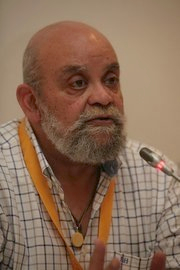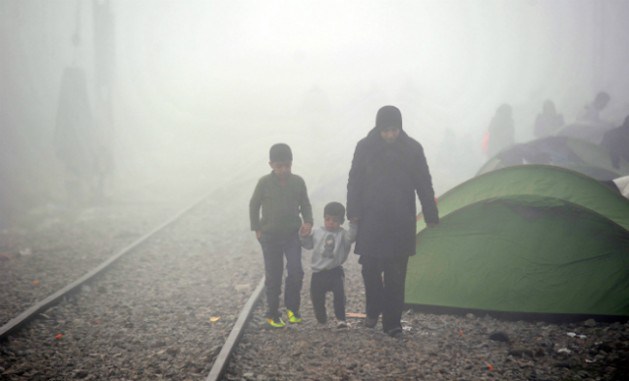By Baher Kamal*
Nevertheless, as a sort of reminder, the United Nations told them again: “millions of people, from Libya to Palestine, from Yemen to Syria and Iraq, have had their lives completely overturned by violence.”
They were also reminded that the huge numbers of people affected by conflict, violence and displacement did little to convey the real trauma experienced.
The Facts
The United Nations reported “more people are displaced by conflict than at any time since 1945.” Figures are self-explanatory. There are currently an estimated total of 60 million forcibly displaced people –either at home or abroad— across the globe.
Of these:
— 5 million Palestinian refugees are still dispersed mostly in neighbouring countries such as Lebanon, Syria and Jordan, according to the UN Relief and Works Agency for Palestine Refugees (UNRWA);
— 1,5 million people are practically besieged in the Palestinian Gaza Strip, in a permanent humanitarian crisis;
— 4 million Syrian civilians so far had to flee war as refugees seeking safety in the region and in Europe, as an immediate consequence of the Syrian five-year long conflict, the UN Refugee Agency (UNHCR) estimates;
— 1 million Syrians have been forcibly displaced from their homes in their own country, according to the United Nations;
— 1 million Libyans are victims of uncontrolled armed fights in their own, unstable state. “There is alarming information coming from Libya about grave acts that could amount to war crimes,” UN secretary general Ban Ki-moon warned on 6 March 2016;
— 5 million Iraqis have been sentenced to the condition of being either refugees abroad or ‘refugees’ at home. Already in July 2015, the top UN humanitarian official in Iraq declared as “devastating” the closure of life-saving services in Iraq for people in need, citing the most recent shut-downs of basic health care will directly impact more than one million people, including some 500,000 children who now will not be immunised, spreading risk of a measles outbreak and resumption of polio;
— 1 million Syrian refugees live in Lebanon. The UN reported six months ago that some 70 per cent of these refugees were living below the extreme poverty line in Lebanon;
— 2 million civilian Yemenis fled to even another war long-hit country–Somalia as result of the on-going armed conflict. More than 15.2 million Yemenis lack access to health care services, well over half the war-torn country’s total population, yet there is a 55 per cent gap in requested international funding to address the crisis, according to the World Health Organisation.
In other words—the Middle East is both the origin of and/or home to 1 in 3 refugees and displaced persons in the whole world.
These major figures refer to the known as ‘traditional’ Middle East region, comprising 22 Arab countries and Israel.
The data go much further when it comes to the so-called “Greater Middle East”, which also include armed conflicts in Afghanistan and Pakistan. The extended region would be in this case origin and home to additional 10 million refugees and displaced persons, this making nearly half of their total numbers all over the planet.
The Ira of Nature
But not only wars and conflicts hit the Middle East–natural disasters do more damage, last longer, and in many places recur before people have even had a chance to recover, according to the United Nations.
So, while all the above is a consequence of armed conflicts, there are other dramatic facts the make of the Middle East ‘the mother of all humanitarian crises’.
Just some examples:
— The Middle East risks to become an ‘uninhabitable’ region due to the impact of climate change
— 2 in 3 Arab countries already suffer from acute water shortage, while the remaining third is considered water unsafe nations;
— The United Nations predicts 40 per cent water shortfall by 2030. The Middle East is expected to be one of the most impacted.
In short, a whole region of nearly 400 million people is already victim of man-made disasters, be these wars and violence or simply the expected response of nature.
“We see it, we live it,…”
The Istanbul World Humanitarian Summit will focus on five key areas: to prevent and end conflict; to respect the rules of war; to leave no one behind; to work differently to end need, and to invest in humanity.
When announcing the Summit, top UN officials, headed by the secretary general Ban Ki-moon, have repeatedly warned that the world is living the worst ever-humanitarian crisis since World War II.
Herve Verhoosel, spokesperson of the World Humanitarian Summit, recently wrote in IPS “We have arrived at the point of no return. At this very moment the world is witnessing the highest level of humanitarian needs since World War Two.”
“We are experiencing a human catastrophe on a titanic scale: 125 million in dire need of assistance, over 60 million people forcibly displaced, and 218 million people affected by disasters each year for the past two decades,” Verhoosel said.
This makes a total of 400 million victims, the equivalent to some 80 per cent of the entire European population.
Verhoosel gave specific figures: more than 20 billion dollars are needed to aid the 37 countries currently affected by disasters and conflicts.
“Unless immediate action is taken, 62 percent of the global population– nearly two-thirds of all of us- could be living in what is classified as fragile situations by 2030. Time and time again we heard that our world is at a tipping point. Today these words are truer than ever before.”
The situation has hit home, Verhoosel said. “We are slowly understanding that none of us is immune to the ripple effects of armed conflicts and natural disasters. We’re coming face to face with refugees from war-torn nations and witnessing first-hand the consequences of global warming in our own backyards.”
“We see it, we live it, and we can no longer deny it.”
Related IPS Articles
- Choose Humanity: Make the Impossible Choice Possible!
- Is the System Broke or Broken?
- Nobel Peace Laureates to Help Achieve Food Security
- MSF Withdrawal Part of Ongoing Debate Over Humanitarian Aid
- Unnoticed, We Are Close to Destruction of Our Planet
- Civil Wars Threaten to Break up a Volatile Middle East
- Hunger, a Matter of Global Security
- Any Ways to Combat Extremism?
- UN Releases Plan to Increase Refugee Responsibility Sharing
Baher Kamal’s report was published in IPS. Go to Original.
 *Baher Kamal, Egyptian-born, Spanish-national secular journalist. He is founder and publisher of Human Wrongs Watch.Kamal is a pro-peace, non-violence, human rights, coexistence defender, with more than 45 years of professional experience.
*Baher Kamal, Egyptian-born, Spanish-national secular journalist. He is founder and publisher of Human Wrongs Watch.Kamal is a pro-peace, non-violence, human rights, coexistence defender, with more than 45 years of professional experience.Baher Kamal is also Senior Advisor to the Director General of international news agency IPS, on Africa and the Middle East.
More articles by Baher Kamal in Human Wrongs Watch:
Mideast: 1 in 3 Pays Bribe to Access Basic Public Services
Climate: Africa’s Human Existence at Severe Risk
No Water in the Kingdom of the Two Seas – Nor Elsewhere
Will the Middle East Become ‘Uninhabitable’?
Can an Animal Heist Fable Help Solve the Middle East Crisis?
A “Colombian Triangle” for Daesh in Libya?
‘Take My Iraqis and Give Me Some Syrians’ – Europe to Turkey
New Nuclear Hysteria in the Middle East
Africa Launches Largest Trading Block with 620 Million Consumers
Big War Lords Playing Brinkmanship Game in Syria
Cameron at large: Want Not to Become a Terrorist? Speak Fluent English!
Women’s Rights First – African Summit
Africa, Only If It Bleeds It Leads?
Seven Top Challenges Facing African Women
Once Auctioned, What to Do with the ‘Stock’ of Syrian Refugees?
Silence, Please! A New Middle East Is in the Making
The Over-Written, Under-Reported Middle East (II): 99.5 Years of (Imposed) Solitude
The Over-Written, Under-Reported Middle East (I): Of Arabs and Muslims
Egypt in the Rear Mirror (I): The Irresistible Temptation to Analyse What One Ignores
Egypt in the Rear Mirror (II): Who Are the Not-So-Invisible Powers Behind the Troglodytes?
Fed Up With Empty Promises, The Arabs May Abandon Nuclear Non-Proliferation Treaty
Anti-Nukes Move from Norway to Bahrain
Middle East Nuclear Free Bid Moves to Finland – Yet Another Lost Chance?
Annual Spending on Nuclear Weapons, Equivalent To UN Budget For 45 Years
Watch The Sky–It May Rain Atomic Bombs
Save The Planet? Just Eat Cars, Drink Fuel!
Who Is Afraid of 300 Or 400 Or 500 Million Miserables?
Violence And Death For Millions Of Life-Givers
Whither Egypt (I) – Did You Say Dictatorship?
Whither Egypt (II) – Economic Bankruptcy
Politicians Promote Fossil Fuels with Half a Trillion Dollars a Year
Who Dares to Challenge a 32 Billion Dollars Business – Human Trafficking?
Palestine: Yet Another One Hundred Years of Solitude
Does Anyone Know Anything About A New Country Called South Sudan?
South Sudan: Yet Another Kitchen-Garden?
Somalia? Which Somalia? Some Facts About Everybody’s — Nobody’s Land
Requiem For Palestine (I): A Conflict Born With A Solution
Requiem For Palestine (II): Can Gruyere Be A Solution?
The Mediterranean Sea Is Sick, Very Sick
2016 Human Wrongs Watch







